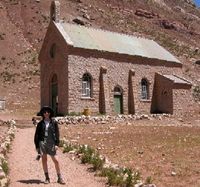Back from the Great Hot North
I had a fabulous trip to southern Alberta, which was considerably hotter than Seattle. I returned bearing many family stories, as well as three slim school notebooks containing the diary of my great-great-aunt written in 1889 at the age of 16. I have already read them all, and I must say, 16-year-old girls are amazingly similar in any era. She writes about boys, clothes, school, feuds with her girlfriends, the weather, and what she eats. While this may not be of massive historical significance, it is a window into daily life in Winnipeg at that time. I will have to return the notebooks, and hopefully I can help their owner find them a good archival home, because it would be a shame for them to molder.
I enjoyed the most gracious hospitality you can imagine from this distant cousin and her husband, who knew me not at all and yet welcomed me with complete warmth. I pored through two large boxes of photos, letters, telegrams, newspaper clippings, and of course, the journals. I filled in some gaps in the family story - particularly about the adventurous aunt who emigrated to New Zealand - and heard an alternative hypothesis for Why Julius Rutabega Changed His Name. I got a quick lesson in the many aboriginal peoples of northern Canada (as much of the far-north family, including my hostess, are of Inuit or other native Canadian origin).
Moxie and I really should buckle down and start writing this damn book, already, because you can spend endless amounts of time on research. But truly, some of the stories - well, you just couldn't make this stuff up. Case in point: one of the 11 siblings in this family we're studying died in 1922 in a dog-sled accident. Family lore says that there were several dog-sled teams crossing the north arm of Great Slave Lake, with Frank and his youngest daughter in one sled and his wife and son ahead of him. Frank's sled broke through the ice, and his companions worked valiantly to pull him out; you have a matter of minutes to survive in water that cold. His rescuers later recounted that they could have saved him, except that they were trying to pull him out by one arm because he was holding onto his little girl with the other arm. With his frantic wife and son looking on, the men begged Frank to let his daughter go and give them both arms, knowing that time was running out and that the child most likely was already lost; but he refused. When they finally did manage to extract him from the water, he was still clutching his little daughter tightly in one arm, and they had both perished. That arm of the Great Slave Lake was renamed Frank Channel in his honor.
Truly, truth is more interesting than fiction.

No comments:
Post a Comment